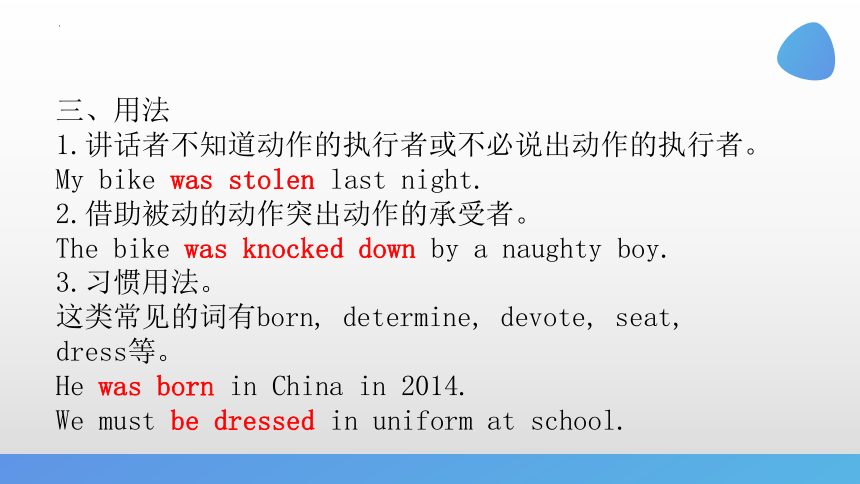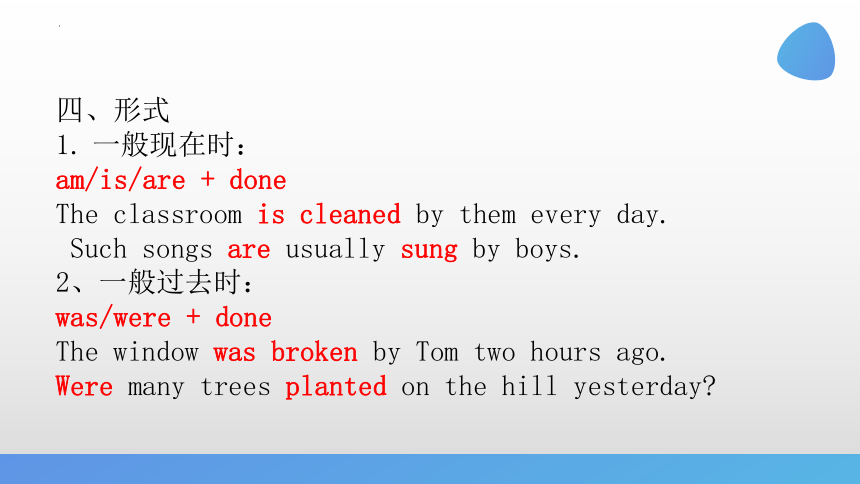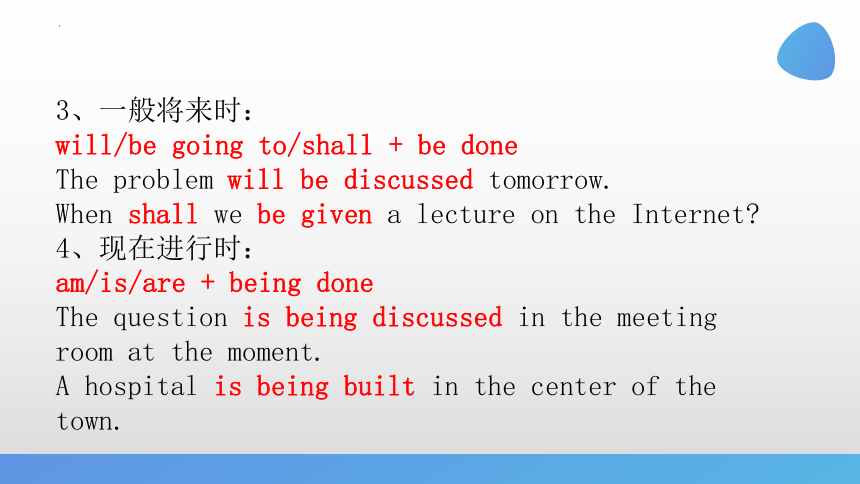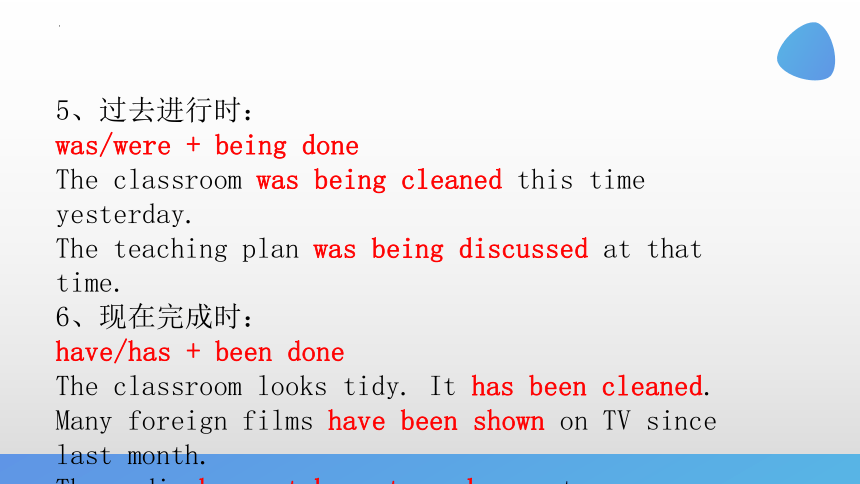北师大版(2019)必修 第一册Unit 3 Celebrations Lesson 1 Spring Festival Grammar(被动语态)课件(共12张PPT)
文档属性
| 名称 | 北师大版(2019)必修 第一册Unit 3 Celebrations Lesson 1 Spring Festival Grammar(被动语态)课件(共12张PPT) |

|
|
| 格式 | zip | ||
| 文件大小 | 106.5KB | ||
| 资源类型 | 教案 | ||
| 版本资源 | 北师大版(2019) | ||
| 科目 | 英语 | ||
| 更新时间 | 2023-04-01 00:00:00 | ||
图片预览






文档简介
(共12张PPT)
Grammar
一、概念
被动语态表示主语是动作的承受者。
二、构成
助动词be+及物动词的过去分词
被动语态
三、用法
1.讲话者不知道动作的执行者或不必说出动作的执行者。
My bike was stolen last night.
2.借助被动的动作突出动作的承受者。
The bike was knocked down by a naughty boy.
3.习惯用法。
这类常见的词有born, determine, devote, seat, dress等。
He was born in China in 2014.
We must be dressed in uniform at school.
四、形式
一般现在时:
am/is/are + done
The classroom is cleaned by them every day.
Such songs are usually sung by boys.
2、一般过去时:
was/were + done
The window was broken by Tom two hours ago.
Were many trees planted on the hill yesterday
3、一般将来时:
will/be going to/shall + be done
The problem will be discussed tomorrow.
When shall we be given a lecture on the Internet
4、现在进行时:
am/is/are + being done
The question is being discussed in the meeting room at the moment.
A hospital is being built in the center of the town.
5、过去进行时:
was/were + being done
The classroom was being cleaned this time yesterday.
The teaching plan was being discussed at that time.
6、现在完成时:
have/has + been done
The classroom looks tidy. It has been cleaned.
Many foreign films have been shown on TV since last month.
The radio has not been turned on yet.
7、过去完成时:
had been + done
He said that the work had been finished.
His newly written novel had been translated into English by the end of last month.
8、含情态动词:
must/may/might/can/could + be done
The problem must be solved soon.
The work can be finished on time.
五、主动表被动的情形
1.表示感官意义的连系动词如smell,feel,taste,look,sound等在句子中常表达被动含义。
Good medicine tastes bitter.
Our school looks more beautiful than before.
2.不定式修饰作表语和宾语补足语的形容词时,如difficult, easy, comfortable, convenient, hard等。
Those signs are hard to see clearly.
I find this question difficult to answer.
3.need, require(需要), deserve(应得,值得),be worth(值得)等词后接doing,此时用主动表被动。
The book is worth reading.
Your hair needs cutting.
4.当句子主语(一般是物)具有某些内在的特征或性质时,如drive, lock, sell等,常用主动形式表示被动含义。
The door won’t lock. (指门本身有毛病)
The door won’t be locked. (指不会有人来锁门)
5.表示开始、结束、运动的动词,如begin, finish, start, open, close, stop, end, run, move等。
The shop closes at 6 o’clock p.m. every day.
The lesson will begin at 8 o’clock.
6.有些不及物动词与副词(well, badly, easily, smoothly(平稳地;平滑得)等)连用时,可以用主动形式表示被动含义。常见的有cut, sell, read, write, cook, wash, clean, burn等。
Meat cuts easily.
His novel sells well.
7.在be to do结构中的一些不定式用主动表被动。
You are to blame for the accident.
The house is to let.
Thank you!
Grammar
一、概念
被动语态表示主语是动作的承受者。
二、构成
助动词be+及物动词的过去分词
被动语态
三、用法
1.讲话者不知道动作的执行者或不必说出动作的执行者。
My bike was stolen last night.
2.借助被动的动作突出动作的承受者。
The bike was knocked down by a naughty boy.
3.习惯用法。
这类常见的词有born, determine, devote, seat, dress等。
He was born in China in 2014.
We must be dressed in uniform at school.
四、形式
一般现在时:
am/is/are + done
The classroom is cleaned by them every day.
Such songs are usually sung by boys.
2、一般过去时:
was/were + done
The window was broken by Tom two hours ago.
Were many trees planted on the hill yesterday
3、一般将来时:
will/be going to/shall + be done
The problem will be discussed tomorrow.
When shall we be given a lecture on the Internet
4、现在进行时:
am/is/are + being done
The question is being discussed in the meeting room at the moment.
A hospital is being built in the center of the town.
5、过去进行时:
was/were + being done
The classroom was being cleaned this time yesterday.
The teaching plan was being discussed at that time.
6、现在完成时:
have/has + been done
The classroom looks tidy. It has been cleaned.
Many foreign films have been shown on TV since last month.
The radio has not been turned on yet.
7、过去完成时:
had been + done
He said that the work had been finished.
His newly written novel had been translated into English by the end of last month.
8、含情态动词:
must/may/might/can/could + be done
The problem must be solved soon.
The work can be finished on time.
五、主动表被动的情形
1.表示感官意义的连系动词如smell,feel,taste,look,sound等在句子中常表达被动含义。
Good medicine tastes bitter.
Our school looks more beautiful than before.
2.不定式修饰作表语和宾语补足语的形容词时,如difficult, easy, comfortable, convenient, hard等。
Those signs are hard to see clearly.
I find this question difficult to answer.
3.need, require(需要), deserve(应得,值得),be worth(值得)等词后接doing,此时用主动表被动。
The book is worth reading.
Your hair needs cutting.
4.当句子主语(一般是物)具有某些内在的特征或性质时,如drive, lock, sell等,常用主动形式表示被动含义。
The door won’t lock. (指门本身有毛病)
The door won’t be locked. (指不会有人来锁门)
5.表示开始、结束、运动的动词,如begin, finish, start, open, close, stop, end, run, move等。
The shop closes at 6 o’clock p.m. every day.
The lesson will begin at 8 o’clock.
6.有些不及物动词与副词(well, badly, easily, smoothly(平稳地;平滑得)等)连用时,可以用主动形式表示被动含义。常见的有cut, sell, read, write, cook, wash, clean, burn等。
Meat cuts easily.
His novel sells well.
7.在be to do结构中的一些不定式用主动表被动。
You are to blame for the accident.
The house is to let.
Thank you!
同课章节目录
- Unit 1 Life Choices
- Lesson 1 Lifestyles
- Lesson 2 Understanding and Coping with Stress
- Lesson 3 Your Life Is What You Make It
- Unit 2 Sports and Fitness
- Lesson 1 The Underdog
- Lesson 2 Rules of the Game
- Lesson 3 Running and Fitness
- Unit 3 Celebrations
- Lesson 1 Spring Festival
- Lesson 2 Special Occasions
- Lesson 3 Memories of Christmas
